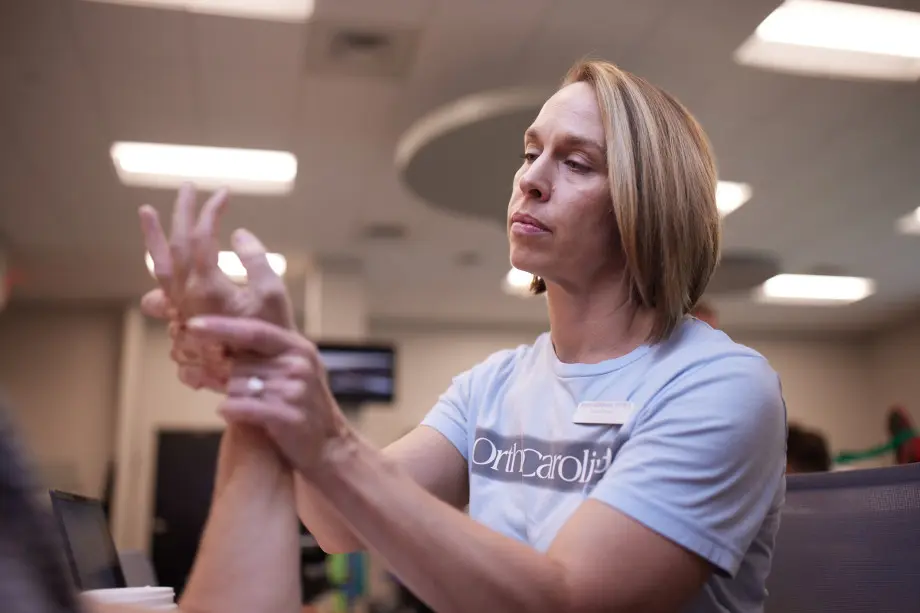
Unlocking Potential, Restoring Independence, and Celebrating Occupational Therapy Month
What is Occupational Therapy?
Throughout life, people may have trouble participating in meaningful activities as a resultof illness, injury, disease, or disorder. Occupational therapy practitioners enable people ofall ages to live life to its fullest by helping them promote health, and prevent—or live betterwith—injury, illness, or disability.
Occupational therapy is the only profession that helps people across the lifespan to do thethings they want and need to do through the therapeutic use of daily activities(occupations)
“Occupational therapy maximizes health, well-being, and quality of life for all people, populations, and communities through effective solutions that facilitate participation in everyday living.” – American Occupational Therapy Association’s 2025 Vision

What Are "Occupations?"
Occupations are “meaningful activities” that we engage in throughout our day. Although people often think of occupations as jobs, there are also many other types of occupations.
- Activities of daily living (ADLs) include eating, dressing, bathing, grooming, and using the restroom.
- Instrumental activities of daily living (IADLs) are not necessary for fundamental functioning but allow individuals to live independently within their community. Some IADLs include cooking, shopping, cleaning, managing money, and taking care of others such as family, children, and pets.
- Other important occupations that help lead a balanced life include play/leisure and social participation. These activities are often affected when someone has a hand injury.
How Do Occupational Therapists Evaluate & Treat Patients?
Occupational Therapists specialize in restoring a person’s ability to participate in the “job of life” – enjoying what you do every day.
An occupational therapist’s work to support patients can take many forms, such as:
- Focusing on fine motor coordination and dexterity activities to help a patient interact with their environment
- Providing adaptive equipment to a patient who has suffered a stroke so that they may dress independently
- Helping an orthopedic patient regain essential hand and upper extremity strength.
Occupational therapists work with a variety of injured or disabled patients across their lifespans using numerous therapeutic techniques to enable them to engage in activities that they find meaningful.
They formulate individualized patient care plans after completing a thorough evaluation. For each patient, they customize interventions, or programs, that ultimately will enable patients to return to their maximum level of function depending on their disability.

Empowering Patients Through Hand Therapy Expertise
Marcie Siebert, MS, OTR/L, CHT was drawn to occupational therapy after her brother was born with a head condition and his OT became family. Marcie's practice features daily encouragement, coaching, and peer mentorship, fostering a supportive community.
In a multi-disciplined amputee clinic, she leads the hand therapy team, preparing patients for prosthetics use and ensuring they're adept with their new devices. Marcie advises those interested in this field to pursue fellowship or residency programs, noting the importance of experience despite the competitive job market.
Common OT Interventions May Include:
- Adapting or modifying activities
- Recommendation of adaptive equipment
- Joint mobilizations
- Soft tissue techniques
- Manual therapy techniques
- Therapeutic exercise & activities
- Functional activity analysis
- Neuromuscular re-education
- Sensory integration
- Custom splinting
- Custom orthotics
Occupational therapists treat patients in a variety of settings that may include inpatient,sub-acute, or outpatient hospital-based programs, private practice, psychiatry, skilled nursing, school-based therapy, and physician-owned clinics.
8 Things to Know About OTs
- Occupational therapy is an evidence-based, science-driven career and course of study.
- The holistic approach of occupational therapists focuses on overall wellness.
- OTs provide habilitation and rehabilitation services.
- Therapists work to identify and minimize environmental factors that might hinder patient progress.
- Psychological, environmental, and social issues treated by occupational therapy can affect people of all ages.
- Common orthopedic and overuse injuries that are treated in our clinics include tendonitis, carpal and cubital tunnel, fractures, amputations, crush injuries, hand reconstructions, joint replacements, sprains, and strains.
- Supracondylar fractures are commonly experienced by children, as the result of trampoline injuries. These injuries can be treated post-immobilization to restore motion and function with the help of occupational therapy.
- Occupational therapists must have a master’s degree for entry-level practice, and OT assistants must have an associate’s degree. Both must pass National Board Certification exams. OrthoCarolina upper extremity specialists hold credentials(CHT) for advanced study and competency in hand and upper extremity rehabilitation

Who is Occupational Therapy Right For?
An occupational therapist’s role is to help restore a patient’s ability to do what is important and meaningful to them, whether they’ve suffered an acute injury, endured a lifelong disability, or experience recurring pain from overuse.
Although different patients may have similar limitations, it is important to focus on activities that are meaningful to the individual patient. No two treatment plans are alike.
Ultimately, patients are more motivated and engaged if they are working on functional activities that are important to them.
OrthoCarolina’s upper extremity and hand specialists are specially trained to help you get back to doing what you love most and living life to the fullest.
Every April, we join the American Occupational Therapy Association in celebrating Occupational Therapy Month to showcase how OT changes lives. Occupational therapy is a vitally important profession that helps people of all ages participate in the activities most meaningful to them.
Occupational Therapy Month at OrthoCarolina, our occupational therapists enrich the lives of our patients, helping them get back to doing what they love with the ones they love.
Back




Leave a Comment